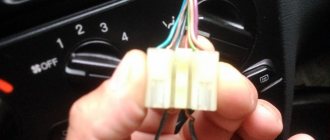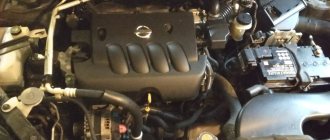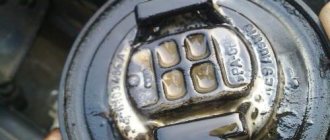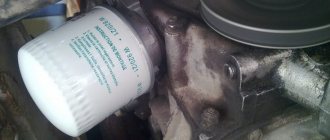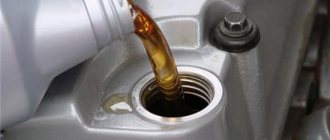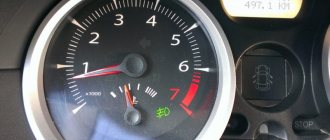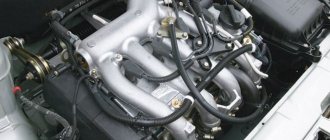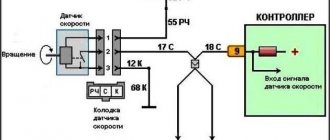During the operation of a car and other equipment, owners often note that the engine has become loud. As a rule, loud engine operation is more likely to occur when the engine is cold; less often, an increase in noise is noticeable when the internal combustion engine is warm.
At the same time, many car owners are beginning to worry whether this phenomenon is normal or if there are any problems with the engine. In this article we will talk about why the engine runs loudly, and also in what cases the noisy operation of the power plant is a sign of a malfunction.
Tags: internal combustion engine Audi 80
Comments 26
Another option is to check what kind of hydraulics are installed, I once installed lightweight new hydraulics and it really worked like a diesel engine, with a louder sound and a little clatter, and this with a good cylinder head. I put new standard hydraulics in place and it became completely quiet. This point needs to be clarified for those who have noisy hydraulics, what kind of hydraulics they have, some B4 models have lightweight ones and some have regular ones, so the force of the valve springs, I think, is different and replacing hydraulic hydraulics in some places is unacceptable. Transitional moment for existentialism in 1994, depending on the wine, all cars up to 1994 with the old type of hydraulics 420 0022 10
The cylinder head rattles, when like a tractor it rattles, it’s only a replacement due to the fact that the wells for the hydraulics are tired. To find the ideal track cylinder head, you probably need to drive for at least a couple of months and also look at each one so that the wells and places for the camshaft are ideal. Then, anyway, you give this cylinder head to replace the guides, valves and adjust the seats, and only after that you will get silence under the hood. There is an option to buy a new non-original cylinder head, but I haven’t tried it, although I think there is a point in it, only it’s more expensive, a non-original cylinder head costs about 7 thousand rubles. without valves + valves + springs with its own cylinder head + again, you give it for reaming for the valves and straightening the seats and then silence will also appear. Naturally, the hydraulics in both cases are also new, that’s another 1,450 rubles.
Refueling with low-quality fuel
Many systems and devices of the power unit can contribute to the fact that a gasoline engine operates like a diesel engine. However, there is one external reason that contributes to the appearance of unusual sounds. This is low-quality fuel.
The main property of gasoline, which characterizes its resistance to detonation (explosive pre-ignition), is the octane number. If the engine is designed for AI-95 gasoline, and at the gas station you were filled with low-octane fuel, troubles are inevitable.
- Under certain loads, fuel detonation occurs, accompanied by detonation knocks reminiscent of the ringing of piston pins and, remotely, the sound of a running diesel engine.
- To increase the octane number, octane-increasing additives are added to low-grade gasoline, which are deposited in the nozzles of the working injectors on an injection engine. The supply of fuel to different cylinders becomes uneven, which leads to harsh engine operation. In advanced cases, the injectors become completely clogged, as a result of which the engine begins to “trouble.”
- The additives contained in “bodied” gasoline cover the electrodes of the spark plugs with a layer of red soot, and due to misfires, the engine again “troubles.”
Tip: try to refuel at chain gas stations located in large populated areas or along busy highways. If you run out of fuel, fill up the minimum amount of gasoline at the first gas station you come across in order to get to the nearest verified gas station.
Reasons for poor engine performance after an oil change
The quality of engine operation in a car largely depends on the brand of fuel and oil used.
The structure of the lubricating fluid affects the condition of the engine as a whole and the level of harmful substances that are released into the environment. Many drivers repeatedly complain about some noise that occurs after changing the oil in the internal combustion engine.
The car engine must work accurately and efficiently. This is the dream of every motorist
It is important to take into account all the details and pay attention to the vehicle so that the entire system works like a clock. It is necessary to follow the maintenance rules for the entire car and for the engine in particular, and change the engine oil on time. Sometimes it happens that after changing the lubricant, the engine begins to knock and make noise.
Sometimes it happens that after changing the lubricant, the engine begins to knock and make noise.
No car can avoid malfunctions. Among them there are some that can be corrected on your own. Some more complex breakdowns should be repaired with the help of professionals at a service station. As soon as you hear extraneous sounds in the engine, you immediately try to understand their causes and fix the problems yourself.
When a car engine makes quite a loud noise during operation, this is most likely due to the following reasons:
- Problems in the gas distribution system or thermostat.
- Ignition problems.
- Problems with the carburetor.
- Problems with the electrical system or power system.
- Low quality gasoline.
With the problems listed above, the engine will become very noisy, smoke will appear, and knocking will occur. These problems were caused by an oil change.
The engine began to run louder, smoke appeared, or a knocking sound? Perhaps the reason for this is also the following:
- the amount of oil is not normal;
- poor quality lubricant;
- dirty grease;
- antifreeze and oil are mixed;
- poor quality oil pump;
- the lubricating fluid used has a significant viscosity.
After changing the oil, the engine smokes and makes noise when starting when cold. This may be caused by increased viscosity of the lubricant, which becomes even thicker in cold weather and may cause knocking in the valve system. In principle, the oil filter usually works properly, but do not forget to change it at certain intervals. Then the filter will have the excellent throughput necessary to move the required amount of lubricant.
As the speed increases, the metallic tapping becomes more distinct. Suspected cause: low oil pressure, valve clearance has increased, or parts are faulty.
It is possible that the oil has not yet advanced to the bearings, which is why knocking is heard after starting a cold engine.
The knock may not be heard when the crankshaft rotates in a certain frequency range. As the rotation speed increases, the knock of the crankshaft becomes more distinct and louder, although at idle it is more muffled.
Bearings wear out in the following cases:
- when the lubricant contains various impurities or water;
- the quality of the oil is poor, perhaps its quantity does not correspond to the norm and does not reach the bearings;
- the roughness of the necks is low.
Immediately after the lubricant hits the bearings, the tapping will disappear in just a few seconds.
A knock can be heard during startup with a cold, warm, or even cold engine. The camshaft produces slightly less noise compared to the crankshaft. However, large gaps or a small amount of lubricant makes the crankshaft knocking similar in frequency to the knocking of the camshaft.
The engine with the hydraulic valve lash compensator began to knock. There may be problems with the lubrication mechanism. It happens that the engine becomes more “calm” after changing the oil and starts working well. However, the engine usually starts knocking just after replacing the lubricant.
Perhaps due to the fact that the engine is new and the car has not even traveled 15 thousand km, that is why the knocking occurs. In this case, lubricant does not immediately flow into certain gaps.
Tips and ways to reduce engine noise
We figured out why the engine is loud, but what to do to reduce the noise level. First of all, the use of high-quality fuel and engine oil, they have a greater impact on the level of extraneous sounds produced by the power unit.
It is clear that to reduce the noise level , you need to determine the source. Often, after repairing an engine, the cause of noisy operation is a replaced part that is installed incorrectly or has some defects.
It happens that after changing the engine oil, flushing the system, using various additives, and performing decarbonization, the engine becomes louder.
The engine may run loudly if the cylinder head gasket is burned out or the fasteners are loose.
If the engine begins to run louder, then it is necessary to take all necessary actions to determine the cause and eliminate them.
Causes of engine knocking
Knocks in the engine cannot be confused with anything. You don’t even need to listen carefully: you can hear him perfectly.
Knocking noise from main bearings
A very dangerous situation for the unit. If detected, you must immediately turn off the engine and go to a service center. This engine knock is heard in the crankcase; when you press the gas pedal, it intensifies. Its appearance is often accompanied by a strong drop in oil level.
Knock of connecting rod bearings
Also very dangerous. The car must be turned off immediately and the service center will be sent in tow. The nature of the sound is rhythmic, sonorous and metallic. It increases greatly when you press the gas pedal and disappears when you remove the spark plug.
Piston pin knock
The knocking of the engine is dangerous, however, if you do not load it too much, you can drive to the service center on your own. The sound is rhythmic, with a metallic tint. The sound is heard constantly, both at idle and at high speeds. Disappears when the spark plug is disconnected.
Knock of worn pistons and cylinders
The sound is not dangerous for the engine, without loading it, you can drive to the car service yourself. The sound is somewhat similar to the knocking of pottery. It is clearly audible when the engine is not warmed up; as it warms up, it decreases or disappears altogether.
Valve knock
Not dangerous for the power unit. You can go to the auto repair center yourself. Metallic sound against the background of general noise. Excellent audibility at low and medium engine speeds. It usually appears when hydraulic compensators fail and need to be replaced.
Detonation sounds
Dangerous for the engine, but can be eliminated by replacing the knock sensor. Without loading the engine, you can easily drive to a car service center. Metallic sounds appear during acceleration. A common cause of breakdown is the use of low quality fuel, as well as carbon deposits in the fuel combustion chambers.
So, what are the main reasons why the engine is noisy?
- And due to a malfunction in the exhaust system;
- Due to the gas distribution mechanism;
- “The engine knocked”;
- Generator malfunctions (belt, bearings)
The engine oil has thickened
Having dealt with the blackening, let's move on to why the driver may detect solid oil in the engine. First of all, motor oils today are all-season, have so-called high and low temperature viscosity (for example, 5W30, 10W40, etc.).
This means that a lubricant of one type or another requires operation in a certain temperature range. Moreover, if the high-temperature viscosity is not so noticeable to the driver, when it gets colder, obvious problems can arise precisely because the oils thicken in the cold.
In other words, at low temperatures the liquid loses its fluidity and in some cases becomes similar to grease. Let us add that usually mineral oil or cheap semi-synthetics, as well as counterfeit products, can thicken so much.
In other cases, in cold weather, oil may be pumped worse through the lubrication system in the first seconds after startup, but then the situation returns to normal. One way or another, the lubricant should be selected taking into account the operating conditions and weather conditions. This will help minimize wear on the internal combustion engine during cold starts. As a rule, high-quality synthetics and hydrocracking oils demonstrate the best results.
However, it must be taken into account that an increase in viscosity can occur both depending on temperature and for other reasons. Moreover, this situation is much more dangerous and you need to figure out why the oil in the engine is like solid oil.
Let's start with the simplest. In a nutshell, any oil tends to “break down” over time. Moreover, if you use the lubricant for a long time (significantly increasing the recommended replacement interval), then the used oil completely loses its properties, accumulates a huge amount of contaminants and turns from a fluid liquid into a gel-like substance.
In this case, no liquefaction occurs even after the engine warms up. The result is severe wear of all parts of the power unit, the appearance of noise, then knocking and, in some cases, engine jamming. Such consequences often result from changing the oil based on mileage rather than engine hours.
In practice, the driver can change the lubricant every 15 thousand km, as stated in the manual. However, taking into account the fact that the car often sits in traffic jams for a long time, the unit idles for hours, etc., the mileage may fall within the specified limits, but in terms of engine hours, such oil has been worn out for a very long time. As a result, instead of a fluid liquid, a substance similar to grease formed in the internal combustion engine.
Currently reading:
Another reason for such dangerous changes in engine oil is engine overheating and polymerization. In simple words, the components stick together, that is, the lubricant “curls” due to high heat.
We also add that in some cases, the ingress of antifreeze or antifreeze into the lubrication system, as well as the accumulation of condensate in the crankcase, also leads to the fact that the lubricant loses its properties, an emulsion forms in the oil and it coagulates.
At the same time, we note that some car enthusiasts practice mixing different oils and also using viscosity additives in order to supposedly improve the basic properties of the oil and avoid its dilution. There have been cases where such experiments made the engine oil too thick with all the ensuing consequences.
Why did the engine become loud?
In modern cars, the sound of the engine is barely audible, but when warming up it is louder than usual, and this is quite normal. But this should not be confused with extraneous sounds in the engine, which have characteristic rattling, rustling and knocking in the internal combustion engine.
In other words, if metallic tapping or barely muffled knocks are heard in the engine, then all this means that the power unit is knocking and needs qualified professional help, and the first thing is high-quality engine diagnostics in a car service center . The problem lies in the connecting rod-piston group, and here, as practice shows, a major overhaul is required. It knocks due to the appearance of play on the crankshaft of the power unit.
If we look at the general increase in noise when the engine runs loudly when cold, then this happens for the following reasons :
- The electronic control unit raises the speed of the power unit so that it does not stall.
- Also, the reason for the increase in internal combustion engine noise is the increased gaps between the parts of the power unit. Due to the large gaps between the walls of the cylinders and pistons, shock loads increase, which is why you can hear the engine running louder. However, as the power unit warms up, the gap decreases and, accordingly, the noise.
- If the car has at least 100 thousand km mileage, then the cause of the extraneous sound may be hydraulic compensators when cold. Due to the fact that the channels are coked, the oil pump is not able to push thick oil inside, as a result, an extraneous “clatter” will be heard, which disappears when the power unit warms up.
Ensuring high speeds on a cold engine is achieved by enriching the fuel mixture. As a result, fuel that was not burned due to the low temperature of the power unit is compensated. In addition, they are needed to ensure its stable operation and high-quality lubrication of parts with engine oil, because when cold it is more viscous and it is much more difficult for the oil pump to pump.
In addition, increased speeds are needed to quickly warm up the catalyst to reduce toxic emissions. As the internal combustion engine warms up, the speed will be reduced by the ECU to the desired level. Accordingly, the motor becomes quieter.
As the ECU warms up, the engine speed decreases, the oil becomes thinner, the gaps become smaller and the car becomes noticeably quieter. Therefore, it is quite obvious why the engine runs loudly when cold, and this is not a big problem or a malfunction of the car.
The engine has warmed up, but has not become quieter?
You definitely need to contact an auto center to have your car diagnosed.
Select a car service
Malfunctions that can lead to increased engine noise
The car owner, having heard an extraneous sound in the engine, begins to form various causes in his head, trying, if possible, to eliminate them on his own. Sometimes he involves his friends in this, who are well versed in the structure of the car.
Let us highlight the main malfunctions that can lead to extraneous noise in the operation of the motor:
- Poor quality fuel and engine oil;
- Problems with the lubrication system;
- Temperature violation;
- Faulty spark plugs;
- Timing belt;
- Hydraulic compensators are knocking;
- Malfunctions in the gas distribution mechanism;
- The problem is in the idle air control;
- Electrical faults.
Obviously, there are many malfunctions, and in order to figure out exactly what the source of the extraneous noise is and why the engine began to run louder, you need to contact a car service center. Ignoring this phenomenon leads to irreversible consequences. Such malfunctions must be resolved at the stage of their occurrence, without delay, otherwise everything leads to an expensive overhaul of the power unit.
Poor quality fuel
For example, if you fill the gas tank with 92 instead of 95, when the recommended fuel for the engine is not lower than 95, then early detonation will appear. This all leads to the motor starting to wear out faster.
Lubrication system problems
A low oil level leads to a decrease in pressure, which causes parts to lack lubrication and begin to wear out faster. There is also a situation when low-quality oil is poured into the internal combustion engine or is unsuitable for a given type of engine, being too thick or viscous, as a result of which the car engine experiences greater loads for it and the sound it produces increases.
Another reason why the engine runs loudly may be that there is insufficient supply of engine oil to the part; as a result, when heated, it expands and begins to knock on adjacent parts of the internal combustion engine.
Open the hood and check the oil level!
The loud sound of a running engine is possible due to a lack of oil in the system; in this case, the characteristic metallic sound of the power unit will be heard. Having discovered this, you must immediately contact specialists to troubleshoot the problem; operating the internal combustion engine without engine oil will lead to expensive repairs.
Select a car service
It may also happen that coolant gets into the engine oil, as a result of which it becomes diluted and loses its lubricating properties, increasing wear on the power unit. This problem is solved by filling with original engine oil for this type of internal combustion engine. If coolant gets into the engine oil, then the problem must be corrected immediately.
Cooling system
Detonation may occur due to instability in the temperature regime of the engine. The thermostat may break. Due to this breakdown, coolant will not be sent to the radiator in the required volume, all this ultimately leads to excessive heating of the power unit and its overheating.
Also, a faulty thermostat causes excess coolant to leak, which leads to insufficient cooling of the power unit, and as a result, to its loud operation. The problem can be solved by cleaning the thermostat or replacing the old one with a new one.
Ignition system malfunctions
The engine may become louder due to incorrectly selected spark plugs, and as a result, fuel detonation.
As a result, the power plant malfunctions and functions unstably. This malfunction makes itself known well - there are noticeable vibrations, excessive fuel consumption, and a decrease in the power of the internal combustion engine.
Timing belt
The cause of extraneous noise may be the timing belt tensioner. The belt gradually stretches slightly, and this leads to an increase in engine noise when revving up.
Rustle of the timing roller bearings, rustling sounds that often occur when the belt is tightened.
A sound somewhat similar to the crackling and rustling of metal can be produced by a stretched chain. Although it's more like a roar and a roar.
Remember that when replacing the timing belt, you need to change the tension pulley. In practice, some craftsmen bill for replacing the entire set, but in fact “forget” to change the roller
If you don't want to be deceived, click on any of the messengers below to learn 5 simple ways to avoid being deceived
